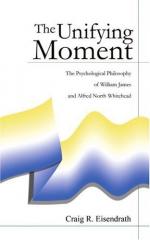|
This section contains 4,714 words (approx. 16 pages at 300 words per page) |

|
SOURCE: “Emerson and Whitehead,” in PMLA, Vol. LXXV, No. 5, December, 1960, pp. 577-82.
In the following essay, Campbell considers similarities in the views of Whitehead and Ralph Waldo Emerson concerning “man's relation to Nature and God.”
In his discerning book entitled Emerson's Angle of Vision, Sherman Paul has pointed out two fundamental ways in which Whitehead, in spite of some obvious differences, is like Emerson. Both Emerson and Whitehead, says Paul, exalted the moral, ethical, and imaginative science of the seventeenth century over the analytical rationalism of the eighteenth century, and, as a logical consequence of this emphasis, both condemned Lockean sensationalism in the same way.1 Following Professor Paul's suggestion, the purpose of this study is to explore in some detail the basic views of Emerson and Whitehead about religion—man's relation to Nature and God. The remarkable similarities between the views of Emerson and those of Whitehead on...
|
This section contains 4,714 words (approx. 16 pages at 300 words per page) |

|


